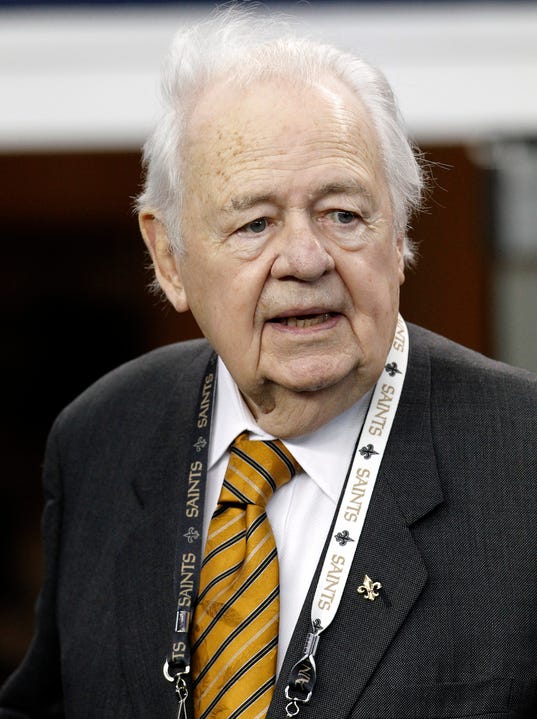
Daniel Milton "Dan" Rooney, (born July 20, 1932) was the United States Ambassador to Ireland from July 3, 2009 until his resignation in 2012. He is chairman of the Pittsburgh Steelers football team in the National Football League (NFL), which was founded by his father, Art Rooney. Rooney was elected to the Pro Football Hall of Fame in 2000 for his contributions to the game. He is credited with spearheading a requirement that NFL teams with head coach and general manager vacancies interview at least one minority candidate, which has become known as the "Rooney Rule".
Ambassador Rooney is well-known in Ireland as one of the founders of the American Ireland Funds which are dedicated to building bridges of peace, culture, and charity in Ireland and Northern Ireland. Ambassador Rooney has also funded the annual Rooney Prize for Irish Literature to highlight the work of Irish writers under the age of 40. He has also been actively involved in charities in the U.S. Among his community activities, Ambassador Rooney was a board member for The United Way of America, The American Diabetes Association, The Pittsburgh History and Landmarks Foundation, and the University of Pittsburgh Medical Center. In February 2000, Ambassador Rooney was recognized by the prestigious Maxwell Football Club in Philadelphia by presenting with the Francis "Reds" Bagnell Award for "contributions to the game of football."
Rooney is also co-founder of the Ireland-related fundraising organization The Ireland Funds.
Life and career
Rooney was born in Pittsburgh, Pennsylvania, the son of Kathleen (née McNulty) and Pittsburgh Steelers' owner Art Rooney. In the Steelers organization, Rooney has been involved in every aspect[citation needed] of the franchise since he was a young boy, often assisting his father at Pitt Stadium and Forbes Field. He grew up in the North Side neighborhood of Pittsburgh and attended North Catholic High School where he excelled as the team's quarterback. He was also the coach for the St. Peter's Elementary school football team, which was quarterbacked by future CIA Director and lifelong friend Michael Hayden. Rooney was mentored by Fran Fogerty, Joe Carr, and Ed Kiely. These men assisted in teaching Dan the business of football. After being mentored and graduating from Duquesne University he knew football was what he wanted to pursue. He then met his future wife in the office of the Steelers where she was currently working. The couple got married soon after. By early 1969 Rooney was managing the day-to-day operations of the team and personally selected the coaching hire of Chuck Noll. He was appointed team president in 1975 and was officially given full operational control of the franchise by his father who remained Chairman and President Emeritus, as well as the public face of the franchise until his death in 1988. During his tenure, he has implemented a philosophy and management style that emphasizes open, practical and efficient management. The results have been obvious: since 1972, the Steelers have won 15 division championships, 8 AFC Championships, and an NFL record 6 Super Bowl Championships. Rooney became the patriarch and controlling owner of the team in 1988, following the death of his father. In 2003, Rooney followed in his father's footsteps by slowly ceding day-to-day operations of the franchise to the next generation of the family. Although still chairman and to many fans the public face of the team, his son Art Rooney II has now assumed full operational control of the Steelers.
Dan Rooney is a graduate of Duquesne University, majoring in accounting. He has been involved with the Steelers since 1960, originally working as director of personnel. While Rooney has generally avoided the spotlight, he has been a very active owner behind the scenes. Rooney helped lead the negotiations of the collective bargaining agreement of 1982, and is largely credited both by owners and players of having ended a strike that lasted half of the season. He is also one of the main architects of the salary cap, which was implemented in 1993. He surprised many with his public endorsement of Barack Obama for president. The family had traditionally been very private on politics, even being rumored to have a Republican bent. Rooney responded to his public endorsement with: "When I think of Barack Obama’s America I have great hope. I support his candidacy and look forward to his Presidency." Rooney is the benefactor of the Rooney Prize for Irish Literature and Vice-Chairman of The American Ireland Fund. He is also a Founding Chairman of The Mentoring Partnership of Southwestern Pennsylvania. In 2008, Rooney became an honorary Commander of the Most Excellent Order of the British Empire. In 2009 he won the 2009 Jack Horrigan Memorial Award, presented by the Professional Football Writers of America to a professional football official or player "for his or her professionalism in helping football writers do their job".
He was named to the PoliticsPA list of "Sy Snyder's Power 50" list of influential individuals in Pennsylvania politics in 2002.
Sale of the Steelers
On July 7, 2008, Dan and his son, team president Art Rooney II, announced that they were seeking to buy out Dan Rooney's brothers' shares in the team. The team initially said that some of Rooney's four brothers want to "get out of the NFL and focus their business efforts on their racetracks and other interests." This was report in The Wall Street Journal's Web site that the Steelers have "been secretly shopped to potential buyers amid continuing divisions among the five sons of the team's founder, Art Rooney Sr." This forced the Steelers to announce that prolonged, ongoing negotiations were under way concerning the "restructuring" of ownership, which could result in the sale of the franchise or a consolidation of control within the Rooney family. Discussions have supposedly been taking place for two years. The team said that chairman Dan Rooney and his son, president Art Rooney II, are trying to buy Dan's brothers' shares in order to "ensure compliance with NFL ownership policies." Dan and Art Rooney II, reportedly control 16 percent of the Steelers' shares but conduct most of the team's operations. Together, the Rooneys hold 80 percent of the company. The other 20 percent is owned by the McGinley Family, who are first cousins of the Rooneys.
The policies refer to The Rooney family's gambling operation. The family owns racetracks in New York and Florida, and the team said "these facilities have added forms of gaming that are inconsistent with NFL gambling policy." The racetracks that were owned by the Rooney's recently received slot machines. According to league policy, no NFL owner may own, directly or indirectly, any interests in a gambling casino. The NFL defines any facility with slot machines as a casino.
One of the Rooneys' interests called into question are the Yonkers Raceway, a harness racing track outside of New York City, which was purchased by the five Rooney brothers in 1972. The facility recently added video gaming machines, slot machines, and now has 5,300 such games, according to its Web site. The other interest is the Palm Beach Kennel Club, a Greyhound racetrack in West Palm Beach, Fla. The track was purchased by Art Rooney Sr. and his five sons in 1970. The facility advertises poker rooms on its Web site.
The Steelers' statement said NFL commissioner Roger Goodell has asked former NFL commissioner Paul Tagliabue to "serve as a league representative in discussions with the family in order to reach an agreement on the separation of the gambling interests and on a restructuring of ownership if the team is sold." Any sale involving an NFL team is subject to a league review and must be approved by 75 percent of member clubs. The Steelers were valued at $929 million by Forbes Magazine in September 2007. However Rooney's brothers: Art Rooney Jr., Timothy Rooney, Patrick Rooney and John Rooney released a statement confirming that they retained Goldman, Sachs & Co. to put a price tag on the franchise, and analysts in New York placed its value between $800 million and $1.2 billion. Their shares are likely worth more than Dan Rooney and son Art II have offered in the initial buyout could raise even higher and still remain under the NFL's ceiling of $150 million in ownership debt. Each Rooney brother's stake is worth about $160 million, or less than Dan Rooney is believed to be offering. Also the brother who may determine if the majority of the team remains in the Rooney family is Art Rooney Jr., a Pro Football Hall of Fame nominee for his drafting skills who was fired by Dan Rooney in 1987.
The brothers likely would not have retained Goldman, Sachs if they felt they could soon work out a deal with Dan Rooney. The move also reflected on their fears that selling to Dan Rooney, coupled with the ensuing taxes, could leave their children and grandchildren with far less money than their shares are worth.
If any of the brothers were to die in the near future without a change in ownership, their heirs would face estate taxes of up to 45 percent of the shares' value. Dan has been working with Morgan Stanley and PNC Financial Services to attempt to bring in additional investors who might prop up his buyout attempt.
However Duquesne Capital Management chairman Stanley Druckenmiller apparently is interested in acquiring the team, according to the Wall Street Journal story. The Associated Press reported on July 8, 2008 that a deal could be reached within days to sell a majority interest in the Steelers to Druckenmiller, taking control of the franchise away from the Rooney family. However Dan Rooney, stopped short of guaranteeing that he and his son, would be able to stay at the helm of a team. He hinted that "many people," not just Druckenmiller, might be interested in the NFL franchise.
NFL spokesman Greg Aiello stated that the NFL will continue to support the Rooneys in their efforts to retain control of the Steelers. The only thing that is known at this time is that the franchise will not relocate to another city, only that the ownership will either change or be consolidated.
On November 21, 2008, the Pittsburgh Post-Gazette reported that,
Tim and Pat Rooney plan to sell each of their 16 percent stake in the Steelers so they can remain involved in racetracks and casinos in Yonkers, N.Y., and West Palm Beach, Fla., family sources told the Post-Gazette. But John and Art Rooney Jr. each plan to keep a little less than half of their 16 percent stake...Dan Rooney and his son, Art, are trying to acquire 30 percent of the team to abide by NFL policy and have compiled a list of investors who, in essence, will become their new partners in the franchise.
Controversies
James Harrison vs. Cedrick Wilson
On March 19, 2008; Rooney released wide receiver Cedrick Wilson from the Steelers, after he was arrested for punching his former girlfriend. However earlier that month, on March 8, Rooney failed to offer any type of discipline to linebacker James Harrison for slapping his girlfriend. When asked about the incident involving Wilson, Rooney stated that "the Steelers do not condone violence of any kind, especially against women,". However he was then confronted about this by Ed Bouchette and Michael A. Fuoco of the Pittsburgh Post-Gazette, who asked why Harrison was not punished for committing the same crime.
Rooney said that the cases were different and stated that "I know many are asking the question of [why] we released Wilson and Harrison we kept. The circumstances—I know of the incidents, they are completely different. In fact, when I say we don't condone these things, we don't, but we do have to look at the circumstances that are involved with other players and things like that, so they're not all the same. What Jimmy Harrison was doing and how the incident occurred, what he was trying to do was really well worth it. He was doing something that was good, wanted to take his son to get baptized where he lived and things like that. She said she didn't want to do it."
Rooney later said that Harrison had no intention of harming his girlfriend when he went to her house to pick up his son. "The situation angered him. He didn't go there with intent." Meanwhile Rooney stated that the Wilson case was different. According to Rooney "[Wilson] knew what he was doing. He knew where his [former] girlfriend was and went to the bar looking for her. When he got there he punched her. That's different and I understand he expressed no regret.
Afterwards Rooney was criticized by the Women's Center and Shelter of Pittsburgh as a result of his comments. ESPN's Matt Mosley later wrote that Rooney's attempt to "explain that Harrison's heart was in the right place ... had to be one of the worst Public Relations moments in club history."
Steelers taxes and taxpayer funding
In August 2004, Pittsburgh Tribune-Review writer Bill Steigerwald reported that Rooney's team received $5 million in state funds for a new, $12 million amphitheater. This was in addition to the $158 million in public subsidies the organization received to build Heinz Field. Steigerwald wrote that: Since the Steelers don't own any taxable property, the Rooneys dodge city and county real estate taxes. Heinz Field, which the Steelers operate and profit from in myriad ways, is owned by taxpayers through the Sports and Exhibition Authority. The team offices, practice field and workout facilities are leased from UPMC's tax-exempt Sports Performance Complex. Steelers players pay payroll and occupation taxes like everyone else. Fans pay the 5 percent city amusement tax on each ticket. But the Steelers - like a few other profit-making corporations - aren't exempt from paying both a city mercantile tax (3 mills on concessions, etc.) and a city business privilege tax (6 mills on gross receipts). Tax officials say these taxes are highly complicated to compute - and the final amounts the Steelers pay are top secret.
Ambassador to Ireland and politics
On March 17, 2009, President Obama announced he had nominated Rooney to become the next US ambassador to Ireland, citing the owner's longstanding support for Irish-American charitable causes. However a March 18, 2009 story in the USA Today, stated that Rooney was awarded the position of ambassador, by Obama, for being "a loyal supporter who campaigned on his behalf in a key battleground state." In 2008, Rooney gave $30,000 to a Democratic Party committee that aided Obama's campaign, according to CQ MoneyLine, a non-partisan group that tracks political contributions. According to David Lewis, a Vanderbilt University political scientist and the author of The Politics of Presidential Appointments, "giving coveted ambassadorships to political supporters is a relatively low-risk way for presidents to repay campaign debts."
Secretary of State Hillary Rodham Clinton swore him in as the new ambassador to Ireland on July 1, 2009. Ambassador Rooney presented his credentials to Irish President Mary McAleese on July 3, before making his first official speaking engagement at lunch hosted by the American Chamber of Commerce Ireland.
In an interview with The Irish Times in April 2011 Rooney mentioned that he would consider resigning his ambassadorship in order to campaign for Obama's re-election. However, in a prepared statement released after that interview was published Rooney stated, "I was asked what I could do to help [Obama] in the next election and I responded that the best thing I could do would be to help him campaign. Were I to do so, it would require my resignation as ambassador to Ireland. However, I am very pleased with my accomplishments to date and I intend to continue to carry out my duties." On December 14, 2012, he resigned as US Ambassador to Ireland and returned to Pittsburgh. He would eventually be replaced in June 2014 by Kevin O'Malley.










